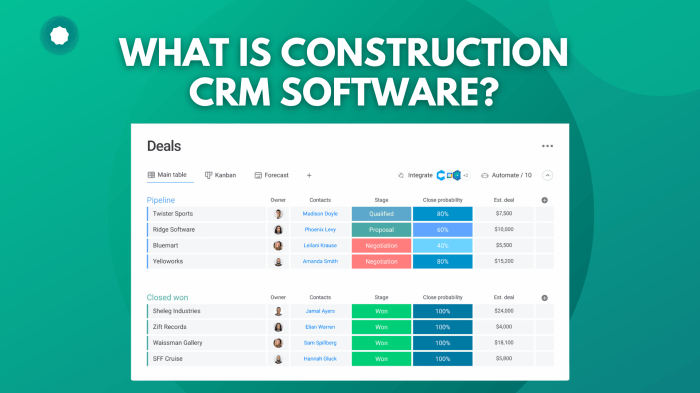Crm software for construction companies – The construction industry is known for its complexity. Juggling multiple projects, managing diverse teams, and tracking intricate details can quickly become overwhelming. Enter Customer Relationship Management (CRM) software – a powerful tool that can significantly enhance efficiency and profitability for construction companies of all sizes. This comprehensive guide explores the benefits, features, and considerations of implementing a CRM specifically tailored for the unique needs of the construction sector.
We’ll delve into key functionalities, integration possibilities, and address frequently asked questions to help you make an informed decision.
Why Construction Companies Need CRM Software
Construction projects are inherently collaborative, involving clients, architects, subcontractors, suppliers, and internal teams. Effective communication and coordination are paramount to successful project delivery and client satisfaction. Traditional methods of managing this complexity, often relying on spreadsheets, emails, and fragmented systems, can lead to:
- Missed deadlines: Poor communication and lack of centralized information can lead to delays.
- Budget overruns: Inefficient tracking of expenses and resources can result in cost overruns.
- Poor client relationships: Lack of timely updates and communication can damage client relationships.
- Reduced profitability: Inefficiencies across the entire project lifecycle negatively impact profitability.
- Increased administrative burden: Manual data entry and lack of automation create unnecessary administrative overhead.
A robust CRM system addresses these challenges by providing a centralized platform for managing all aspects of the construction process, from lead generation to project completion and beyond. This leads to improved project visibility, streamlined workflows, and enhanced communication – ultimately boosting efficiency and profitability.

Source: fitsmallbusiness.com
Key Features of Construction-Specific CRM Software: Crm Software For Construction Companies
While generic CRM systems offer a solid foundation, construction-specific software often incorporates features tailored to the industry’s unique requirements. These features typically include:
Project Management Capabilities:
- Detailed project tracking: Monitor project progress, milestones, and deadlines in real-time.
- Resource allocation: Efficiently assign and manage resources (personnel, equipment, materials).
- Document management: Centralized storage and access to all project-related documents (contracts, blueprints, permits).
- Progress reporting: Generate automated reports on project status, budget, and timelines.
- Issue tracking and resolution: Identify, track, and resolve project issues efficiently.
Client Relationship Management:
- Lead management: Capture and nurture leads from various sources (website, referrals, networking).
- Contact management: Maintain comprehensive contact information for all stakeholders.
- Communication tools: Facilitate seamless communication through email, calls, and messaging.
- Client portals: Provide clients with secure access to project information and updates.
- Customer satisfaction tracking: Monitor client satisfaction and identify areas for improvement.
Financial Management Integration:, Crm software for construction companies
- Expense tracking: Accurately track project expenses and budgets.
- Invoicing and payment processing: Streamline invoicing and payment processes.
- Financial reporting: Generate detailed financial reports for analysis and decision-making.
Subcontractor Management:
- Subcontractor database: Maintain a database of qualified subcontractors with their contact information, qualifications, and performance history.
- Communication and collaboration tools: Facilitate communication and collaboration with subcontractors.
- Performance tracking: Monitor subcontractor performance and identify potential issues.
Choosing the Right CRM for Your Construction Business
Selecting the right CRM involves careful consideration of several factors:
- Size and complexity of your business: A small business may need a simpler solution than a large enterprise.
- Specific needs and requirements: Identify the key features and functionalities that are essential for your business.
- Budget: Consider the cost of the software, implementation, and ongoing maintenance.
- Integration capabilities: Ensure the CRM integrates seamlessly with your existing systems (accounting software, project management tools).
- Scalability: Choose a CRM that can grow with your business.
- User-friendliness: Select a CRM that is easy to use and navigate for all team members.
- Vendor support: Ensure the vendor provides adequate support and training.
Integration with Other Construction Software
Many construction CRMs offer seamless integration with other industry-specific software, creating a unified ecosystem for improved efficiency. This can include:
- Project management software: Integrate with tools like Procore, PlanGrid, or Autodesk BIM 360 to streamline project workflows.
- Accounting software: Integrate with accounting software like QuickBooks or Xero to automate financial processes.
- Estimating software: Integrate with estimating software to improve accuracy and efficiency in the bidding process.
These integrations eliminate data silos, reducing manual data entry and ensuring consistency across all systems.

Source: cjpath.com
Frequently Asked Questions (FAQ)
- Q: How much does construction CRM software cost? A: The cost varies greatly depending on the features, vendor, and number of users. Expect to pay anywhere from a few hundred dollars per month to several thousand dollars per month for enterprise-level solutions.
- Q: How long does it take to implement a CRM? A: Implementation time depends on the complexity of the system and the size of your business. It can range from a few weeks to several months.
- Q: What are the benefits of using a cloud-based CRM? A: Cloud-based CRMs offer accessibility from anywhere, automatic updates, and reduced IT infrastructure costs.
- Q: Can a CRM help improve client satisfaction? A: Yes, by improving communication, providing timely updates, and addressing client concerns efficiently, a CRM can significantly enhance client satisfaction.
- Q: What are some examples of construction CRM software? A: Popular options include CoConstruct, Buildertrend, and ServiceTitan (though some have broader applications than just construction). Research is key to finding the best fit for your specific needs.
Conclusion
Implementing a CRM system is a strategic investment that can transform the way construction companies operate. By streamlining processes, improving communication, and enhancing client relationships, a well-chosen CRM can significantly boost efficiency, profitability, and overall success. Take the time to research different options, consider your specific needs, and choose a solution that will empower your team to deliver exceptional results.
References
Call to Action
Ready to take your construction business to the next level? Contact us today for a free consultation to discuss your CRM needs and explore the solutions available.
Quick FAQs
What are the key features to look for in construction CRM software?
Key features include project management tools, contact management, lead tracking, document management, reporting and analytics, and integration with other business software.
How much does construction CRM software cost?
Costs vary greatly depending on the features, number of users, and vendor. Expect a range from affordable monthly subscriptions to more substantial upfront investments for enterprise-level solutions.
How long does it take to implement a CRM system?
Implementation time varies depending on the size and complexity of the company and the chosen software. It can range from a few weeks to several months.
What are the common challenges in implementing construction CRM software?
Challenges include data migration, user adoption, integration with existing systems, and ensuring data accuracy and consistency.
Can CRM software help improve client satisfaction?
Yes, by improving communication, tracking project progress, and addressing client concerns efficiently, a CRM can significantly enhance client satisfaction.
